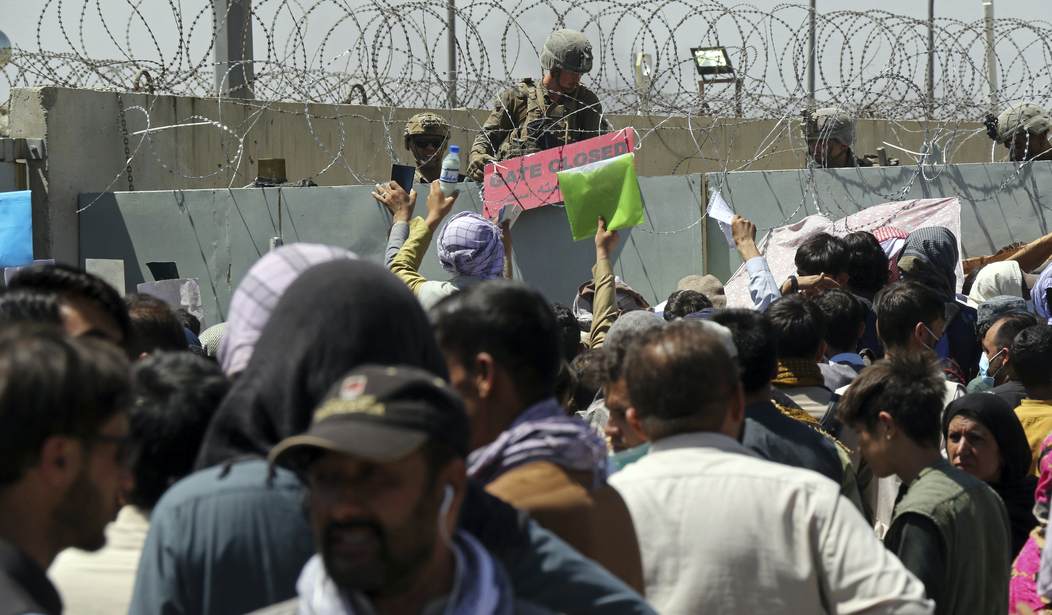Most everyone knows Joe Biden’s troop withdrawal from Afghanistan last summer was an unmitigated disaster of historic – and deadly – proportions.
Not the decision to remove the last 2,500 U.S. troops after 20 years of war. That was inevitable and actually made two years ago by Donald Trump.
But there was continuous mismanagement of the withdrawal ordered by a 79-year-old who distrusts the military and can’t remember the name of his Defense Secretary. Biden had vowed a “safe and orderly” exit.
Now comes a devastating 2,000-page after-action report by the Army with new, previously unpublished details about the withdrawal and evacuation’s shocking behind-the-scenes chaos and abysmal preparation by the State Department and Biden White House.
It shows that weeks before the Taliban victory, diplomats and White House officials resisted military advice that the situation was deteriorating rapidly and evacuation planning was necessary.
At the White House, the president and his posse of younger aides were so focused on the perceived political prize of finally getting all U.S. troops out that they ignored strategic advice from generals on how to do that safely.
The result was a premature withdrawal of all troops before thousands of American citizens and Afghan allies were evacuated, leaving them abandoned, terrified, and defenseless as Afghan forces completely collapsed and the Taliban quickly seized the entire country. Thousands are still stranded there.
In an ad hoc bid to recover, Biden then ordered twice as many troops back in as he’d just withdrawn to try and control the frightened mobs that had descended on the Kabul Airport to flee for their lives. In the confusion, a homicide bomber set off his explosive vest packed with ball bearings, killing 13 U.S. service members and nearly 200 Afghans.
The Army document was first reported by the Washington Post. (Subscription)
The report also contains shocking descriptions of embassy personnel, some intoxicated, resisting evacuation plans seemingly oblivious to the danger in the approaching Taliban convoys, capturing some 10 provinces a day.
Right until near the end, the acting U.S. ambassador, Ross Wilson, actively resisted planning for evacuation because, he said, he couldn’t operate an embassy if people were evacuated.
And he said active departure preparations would set off panic and prompt defeat, which was happening already. The result, of course, was panic anyway, except no one had prepared.
The U.S. military learned numerous lessons from the Vietnam defeat. But clearly not the diplomats. The exact same thing happened in Saigon in 1975.
As Vietcong forces closed on the South Vietnamese capital and pedestrians downtown could hear cannon fire in the suburbs, Ambassador Graham Martin refused to allow evacuation preparations for fear it would concede defeat and cause widespread panic. Which happened anyway. Only worse without preparations.
About 10 days before the end there, a high-ranking CIA official went around the ambassador, secretly alerting select groups including news media, that the end was near and they should get their people out.
The result, as now in Afghanistan, was that thousands of South Vietnamese allies, who’d helped Americans during the war, were left behind subject to arrest, interrogation, reeducation camp internments, and worse.
In Afghanistan, about 124,000 people, not all of them vetted, were evacuated by Aug. 31. The administration claims this as a big victory.
In a nationwide TV interview, Biden vowed that troops would not leave until everyone who wanted out actually got out. His own State Dept. has estimated, however, that some 12,000 Americans remain stranded in Afghanistan, hoping to escape on now-resuming evacuation flights. Another estimated 60,000 Afghan allies and family are presumed in hiding.
In mid-August as Afghan President Ashraf Ghani fled his country, according to the Army report, U.S. troops of the 10th Mountain Division walked room to room through the Embassy urging haste as provinces fell one by one. They reported very few evacuation preparations with some staff cowering and others drunk.
Rear Admiral Peter Vasely, the top commander on the ground at the time, told Army investigators the U.S. would have been much better prepared for an orderly evacuation “if policymakers had paid attention to the indicators of what was happening on the ground.”
National Security Council officials convened a meeting in early August and, even that late, decided evacuation preparations were premature.
A certain tension is always present in overseas relations between diplomats, trained to prolong peaceful relations with a host country, and the military, called in to salvage a deteriorated situation.
“The embassy needed to position for withdrawal,” one officer told investigators, “and the Ambassador didn’t get it.”
The report documents a profound lack of preparation for the worse by the Biden administration at every stage. The word “Benghazi” immediately leaps to mind. On the anniversary of 9/11 in 2012, in the fourth year of the Obama-Biden administration, violent demonstrations broke out across the Mideast, including the storming of the U.S. Embassy in Egypt.
That night, a mob assaulted and burned the consulate in Benghazi, where security had been cut by Hillary Clinton’s State Dept. Four Americans were killed and no rescue was attempted because no preparations had been made.
The Afghan report does not accuse anyone by name. But the timing of its details, for instance, shows that Biden had been told in July that a quick collapse of Afghan forces was likely, even as he said publicly the exact opposite.
Facing panicked mobs at the Kabul Airport and unknown security threats, U.S. troops were also hampered, unbelievably, by thousands of special requests from the Biden White House and members of Congress, all safely back in Washington. They wanted the hard-pressed troops to find and rescue certain Afghans in the throng, typically their friends.
The special people included a number who were not really eligible for evacuation. First things first, right?
Ever since the deadly debacle, Biden and aides have grasped every opportunity to create distractions with other narratives such as a declining unemployment rate that place them in a good light and might help their fallen job approval going into this year’s midterm elections when they’d like the bungled Afghan op to be forgotten.
The military’s valor and duty came through once again, even in that confused crisis. There “might have been other plans that we would have preferred,” CentComm Commander Marine Gen. Frank McKenzie told the Post, “But when the president makes a decision, it’s time for us to execute the president’s decision.”
But this ugly chapter in the nation’s history is likely to resist wishful political stain removers even over time. Will there be consequences for leaders who displayed this overwhelmingly lethal bad judgment?
Do you remember all the folks who were charged after Benghazi for the absence of preparation and backup, for concocting blame for an obscure YouTube video for the uprising, the absence of President Obama throughout the nightlong crisis, and the fumbled handling while four Americans died?
No, you don’t. You can’t. There were no consequences. Just a lot of talk. Washington covers for its own, on all sides.













